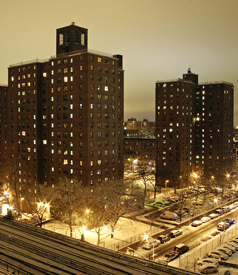Earlier this week housing rights advocates from eight different cities met with Reps. Maxine Waters (D-CA) and Nydia Velázquez (D-NY) in Washington, D.C. to voice their opposition to a bill that they say would privatize the nation’s public housing and push what they see as alternatives.
Members from the Right to the City alliance, a national network of housing rights activists, claimed the Preservation, Enhancement, and Transformation Act (PERTA) — a bill sponsored by HUD and currently being considered by Congress — would make a dreary public housing landscape even worse by allocating $350 million toward building a project-based voucher system. Critics say a voucher system could leave what’s traditionally been a stable market for low-income renters vulnerable to the pitfalls of an unstable private market where rents often exceed $1,000.
The alliance also presented to Congress an extensive report on the state of public housing in eight cities around the country, including New York City, New Orleans, Los Angeles and San Francisco. Using research comprised primarily by residents who live in public housing units in these cities, “We Call These Projects Home: Solving the Housing Crisis from the Group Up” found that, despite years of government disinvestment and negative media portrayals, public housing actually works when it’s invested in. What’s more:
- Between 1995-2008, roughly 200,000 public housing units were demolished.
- For every every ten low-income residents who qualify for public housing, only 3.5 units are available.
- From 2002 to 2008 public housing lost nearly $3 billion nationally in operating subsidies.
- Federal disinvestment leaves many units to go into disrepair.
“I know how badly people need public housing,” said Emma Harris, a member from San Francisco and a public housing resident. “Yet over 250,000 people are on the waitlists for public housing in the cities we studied. Our participants waited an average of six years to get into public housing. I was on a waitlist for 10 years. Congress must take immediate action to address this crisis by maintaining and expanding public housing.”
To that end, the alliance re-introduced its own solution: the Together We Care Act. Introduced by Rep. Velazquez last year, supporters say the act would create construction jobs for public housing residents and expand public housing by repealing a Reagan-era law that prohibits construction of new units.
“Millions of people are paying over half of their income for housing,” said Alexa Kasdan in a press release, Director of Research and Policy at the Urban Justice Center and one of the primary researchers for this report. “There is a desperate need for low-income housing that is not being met by the private housing market.”
Join us in defending the truth before it’s too late
The future of independent journalism is uncertain, and the consequences of losing it are too grave to ignore. To ensure Truthout remains safe, strong, and free, we need to raise $43,000 in the next 6 days. Every dollar raised goes directly toward the costs of producing news you can trust.
Please give what you can — because by supporting us with a tax-deductible donation, you’re not just preserving a source of news, you’re helping to safeguard what’s left of our democracy.
